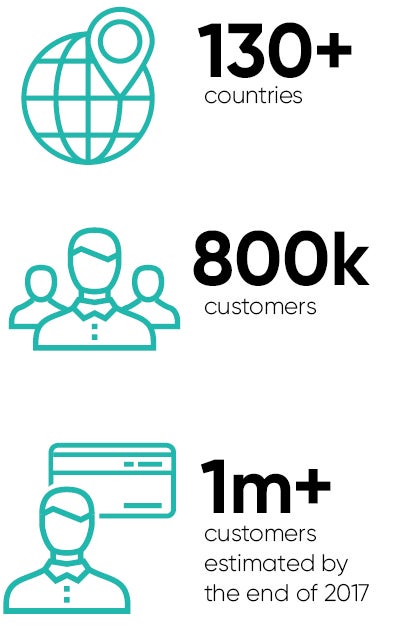
It was not so long ago that the realms of cryptocurrency were firmly the preserve of online enthusiasts, relegated to the deepest corners of the web. Fast forward to 2017 and rapid advances in digital technology are changing the face of financial services, with digital currencies at the very heart of the transformation.
Bitcoin, the most famous cryptocurrency, and its peers have seen their popularity soar amid growing demand from consumers for a financial solution that is not at the mercy of national governments. You only need to look at the dizzying heights bitcoin has reached since its debut in 2009 to see that this trend shows no signs of slowing. From an unchartered concept, bitcoin is poised to become part of consumers’ everyday existence.
Unsurprisingly, it has been hailed the new gold among investors, with its safe haven appeal amid growing geopolitical tensions and lacklustre markets, sending prices rocketing. While it may not have a physical form, the rewards for those who have invested are very real. For most of 2010, bitcoin traded at 6 cents; today the currency sits comfortably around the $4,000 mark, having quadrupled in value this year alone. It is a phenomenon that the world can no longer afford to ignore.

For Pavel Matveev, chief executive of the world’s biggest blockchain personal finance platform Wirex, we are only at the beginning of the story.
“The rising demand we are witnessing is testament to the growing need for a form of currency that reflects the modern world and the technological revolution we are undergoing,” he says. “Bitcoin, and cryptocurrencies in general, have the potential to change how millions of people around the world conduct their financial situation on a daily basis. We have moved beyond the early-adoption phase and are rapidly moving towards the mainstream.”
The numbers speak for themselves; in the three years since Wirex’s inception, the company has accumulated more than 800,000 customers across 130 countries and recently celebrated transacting $1 billion of business.
“The implications of cryptocurrencies are huge,” says Mr Matveev. “Financial experts are agreed that their evolution has set in motion huge changes for the financial exchange system and we are seeing increasing numbers of people demanding the option to use digital currencies alongside traditional payment methods.”
While the lack of regulation surrounding cryptocurrency has posed one of its greatest challenges to date, it has also been its biggest asset. Bitcoin operates on a distributed ledger, with every creation or transfer archived for maximum transparency, but unlike fiat currencies, bitcoin and its comperes are free of government manipulation. In an era of recession, quantitative easing and experimental monetary policy, it is easy to see why this is particularly appealing.
What’s more, it is devoid of the ties that come with traditional banking methods. The beauty of bitcoin payments is that they are peer to peer; individuals can transfer money directly to one another at a faster rate and international payments are considerably cheaper, especially so for lower sums of money. In an increasingly globalised world, this more efficient alternative is proving alluring.
According to Mr Matveev, sending money across borders via bitcoin is an improvement on the outdated, expensive and often frustrating financial infrastructure of conventional methods.
He says: “Firstly, both parties require their own bank account and this might be problematic, or indeed impossible for some people or in some more remote parts of the world. Secondly, individuals must contend with high transfer fees.
“Bitcoin has the power to provide financial services to hard-to-reach communities and democratise financial services for all, in a way traditional currencies cannot. We believe that geographical limitations in finance should be a thing of the past.”
Such is its growing attraction that in April Japan became the first country to recognise bitcoin as an official payment method. Its decision to do so placed it firmly at the head of the pack and has set in motion what could well be a global trend.
In June, the International Monetary Fund released a report in which it found that “boundaries are blurring” and recognised the ability of fintech to innovate the financial system.
It’s time to combine cryptocurrency with traditional currencies in our daily finances
“Japan’s decision marked a triumph for cryptocurrencies,” notes Mr Matveev. “It has helped to instill confidence in businesses to incorporate bitcoin into their offerings, and provided consumers with greater flexibility and choice. We believe that everyone should be part of the financial revolution; it’s time to combine cryptocurrency with traditional currencies in our daily finances.”
Wirex has been at the forefront of the bitcoin evolution as the first to combine the speed and flexibility of blockchain finance with the acceptance of fiat currency, all in one account. The company offers secure digital wallets and pre-paid Visa cards used by customers around the world to convert quickly between bitcoin and national currencies, including pounds, dollars and euros. It will soon launch the first contactless plastic cards for use with a cryptocurrency platform.
Its popularity stems from its ability to provide better foreign exchange rates, faster KYC (know-your-customer) verification and far quicker delivery times from card printing facilities located around the world.
Mr Matveev says: “In recent years, consumers have been dealt a series of shocks from the recession to Brexit, of which the latter’s consequences are still unknown. Cryptocurrencies ensure land borders have no impact on consumer’s financial freedom. While banks make their services complicated or difficult, the use of digital wallets and cards makes global payment technology simple.”
According to Worldcoinindex, there are now more than 500 cryptocurrencies in existence and earlier this year bitcoin’s market capitalisation surpassed $50 billion for the first time.
As Warren Buffet once said: “Someone is sitting in the shade today because someone planted a tree a long time ago.” It’s clear that enthusiasm, determination and demand will continue to push cryptocurrencies to the fore. For Wirex, we are only on the cusp of what promises to be an exhilarating financial revolution.


